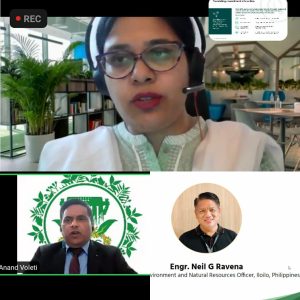ICLEI South Asia organised a side event on ‘Circularity to Overcome Plastic Waste Management Challenges’ at the ICLEI World Congress on the 13th of May 2022 in Malmo, Sweden. The three-day conference was attended by the local and regional government representatives from over 150 different cities, towns and regions.
The virtual session discussed the issues and challenges arising out of inadequate management of plastic waste. It introduced circularity concepts in plastic waste management through successful and replicable case stories of circular waste management from different parts of the world.
The speakers for the session were – Gunilla Carlsson, an experienced Expert in Waste Management, Communications, and Public Affairs from SYSAV (Sotenäs region, Malmo); Anand Voleti, Team Head, Greater Warangal Smart City Corporation; Neil Ravena, Engineer, Acting City Environment and Natural Resources Officer of Iloilo, Philippines; and Esha Sar, Chief Advisor, South Asia, Alliance to End Plastic Waste (AEPW).

Ms. Sar mentioned that in order to move towards a fully circular ecosystem, there are intermediate interventions and transitional solutions that need to be deployed.
“The various solutions that are globally available – the strategy that is chosen for a particular community should be formulated within a local context considering the unique circumstances that prevail in that community and their position in the waste management hierarchy,” she said.
Anand Voleti shared insights about the challenges and initiatives for managing plastic waste in Warangal city in Telangana. He mentioned that the plastic consumption rate is growing by 20% every year, and recycling of plastic is a major concern.
“Although we say 74% of plastic is recyclable, out of which 53% is not recyclable. We claim to collect 58 tons of plastic, but the 42 tons is not accountable which means we are not able to trace it,” he said.
“We have 26 dry source collection centres operated by self-help groups, majorly by women entrepreneurs. We also collect waste through waste pickers – about 800 of them. Apart from this, the state government has banned single-use plastic. There are various awareness programs like walls have been painted with murals at key locations to educate the consumers,” Mr. Voleti added.
As part of the awareness campaign, Warangal has declared two colonies as plastic-free where the citizens have taken oath not to use single-use plastics.
Engr. Ravena shared the challenges of plastic waste management in the city of Iloilo, Philippines. The city witnessed an increase in the volume of plastic waste during the pandemic. More plastic was being used for packaging and quarantine facilities.
Talking about the current situation, he said, “30% of our waste is plastic. The city constructed a 23-hectare materials recovery facility that could sort 10-15 tons of waste a day.”
He shared that the current at source and household segregation level is poor. “If we are able to separate the organic from inorganic then we can maximise sorting of plastics in our area,” he added.
Gunilla Carlsson praised the waste collection system in Sweden and shared some challenges they have at hand. “A lot of plastic waste is not collected and recycled in the way that it should be. Now we need to incinerate it because in Sweden it is not allowed to put anything that is burnable on the landfill. And since we have very few facilities for after sorting, that leaves us with incineration,” she said.
Another major challenge she mentioned is the built-in plastics in all the materials which has substance that can not and should not be recycled.
“The plastic sits there until we discard the materials, and the materials go into the waste management system. Then we decide if it is suitable for recycling or is it necessary to incinerate instead. With incineration – another problem is it creates fossil carbon dioxide. The only solution to achieve full circularity is to forbid those materials,” she elaborated.
As a key takeaway it was agreed upon that to address these challenges the responsibility and accountability lie at all levels.
Ms. Soumya Chaturvedula, Deputy Director, ICLEI South Asia who also moderated the session, summed it up by saying, “we hope some of these global treaties will be able to tackle these issues across geographies and value chain of plastics.”